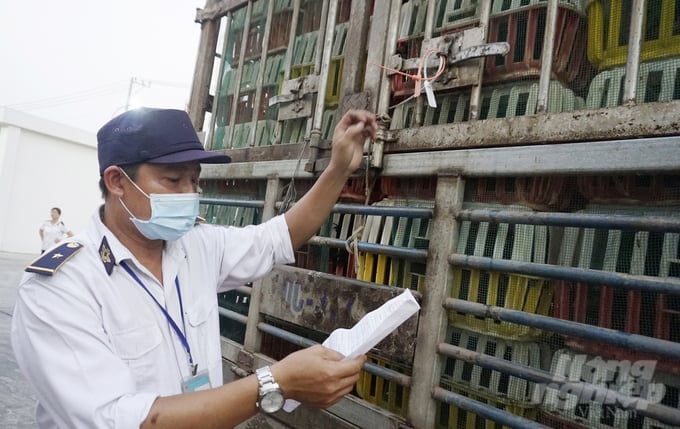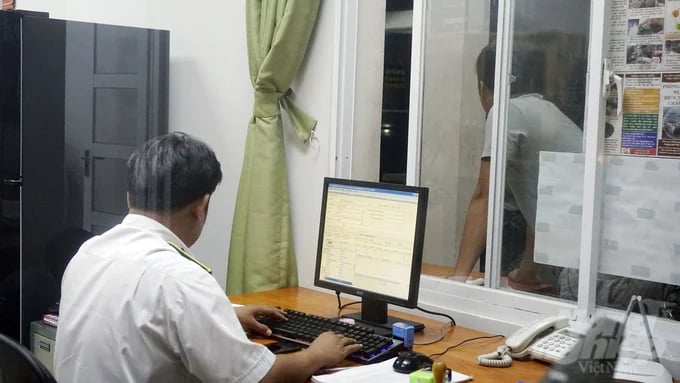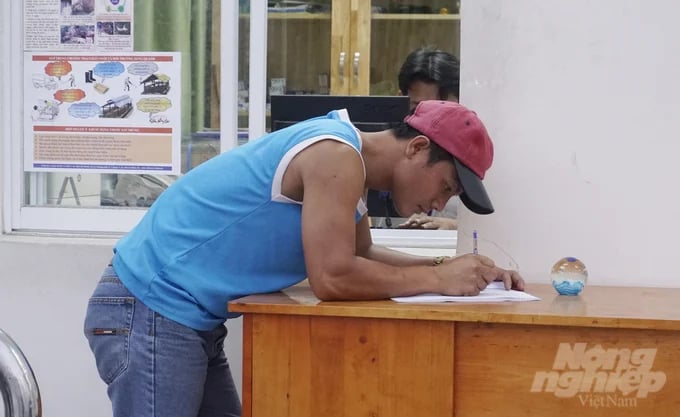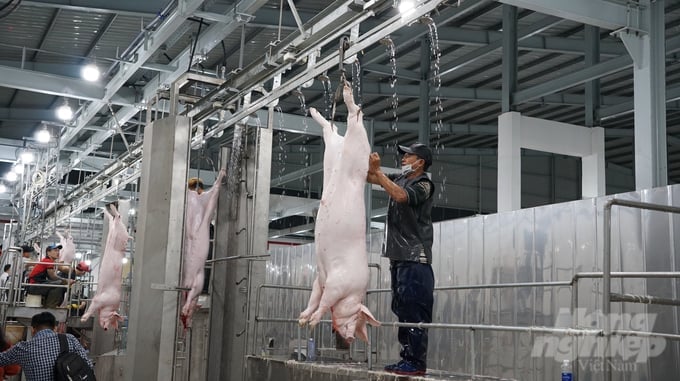May 21, 2025 | 03:10 GMT +7
May 21, 2025 | 03:10 GMT +7
Hotline: 0913.378.918
May 21, 2025 | 03:10 GMT +7
Hotline: 0913.378.918

Veterinary officers check information before animals are transferred for consumption in Ho Chi Minh City. Photo: Nguyen Thuy.
According to data from the Ho Chi Minh City Animal Husbandry and Veterinary Sub-department, currently, the total herd of buffaloes and cows in the area is over 94,000 (over 8,800 households). Of these, large-scale livestock farming accounts for only 0.01%, and smallholder farmers account for over 78%. The total herd of pigs is over 168,000 (over nearly 1,800 households). Of these, large-scale farms account for nearly 1.3%, and small household farms account for over 80%. The total poultry herd is over 243,000 heads, raised at 11 concentrated breeding facilities.
Ho Chi Minh City is a focal point for the circulation and consumption of large quantities of food every day, but with the rapid pace of urbanization, the area of agricultural land is increasingly shrinking, and the passive internal capacity has not met people's demand for livestock and poultry products. Consequently, the city has to import a large amount of livestock and poultry products from the provinces.
Therefore, disease control management is given top priority by the veterinary force. This is to ensure disease safety in livestock herds. Animal products serving consumption in Ho Chi Minh City must be strictly controlled right at the gateway.
Faced with practical requirements, in recent years, the Ho Chi Minh City Animal Husbandry and Veterinary Sub-department has deployed the use of a number of internal specialized software for management purposes. The software has been built and applied for many years, based on the specialized management requirements of superiors. Over time, the software is updated and supplemented according to actual applications and new regulations.

Veterinary staff at Thu Duc Animal Quarantine Station update livestock and poultry information, forwarding to the City into the internal control software. Photo: Nguyen Thuy.
Ms. Le Dinh Ha Thanh, Deputy Director of the Ho Chi Minh City Animal Husbandry and Veterinary Sub-department said that, all the software for managing livestock facilities, software for managing animal slaughter facilities, and software for updating information at animal quarantine stations in the city... are operating at a stable condition.
Some software is linked together, such as software at Animal Quarantine Stations that will update information and the origin of shipments of animals and animal products from the provinces brought into the City for slaughter and consumption.
At slaughterhouses, there will be management software linked to software at quarantine stations enabling the retrieval of information. Consequently, it helps facilitate control and management, employees do not need to enter the information again", the Deputy Director of the Ho Chi Minh City Animal Husbandry and Veterinary Sub-department said.
Also according to Ms. Thanh, currently the Sub-department still has some software that is built and operates separately, not yet integrated into a common database source. As a consequence, the Ho Chi Minh City Animal Husbandry and Veterinary Sub-department is proposing and implementing the project "Building a digital map for livestock management and animal diseases in Ho Chi Minh City".
The goal of this project is to support animal husbandry and disease management using WEBGIS to help look up information easily and intuitively, integrating information into the process of building smart urban areas and digital cities. Additionally, contributes to improving the management capacity of state agencies to serve the construction of smart cities.
Similarly, support people, local governments, and state agencies to make the search, monitor and manage planning work of livestock and poultry raising facilities, animal disease outbreaks, animal slaughter facilities, and animal feed production facilities,... in the city more easily and more synchronized and coherent.
After that, an information system will be formed with a fully integrated and complete database to serve specialized management, allowing users, including managers, businesses, and citizens to access even on mobile devices.
This system is associated with digital maps, allowing managers to have a more intuitive and complete view, thereby providing more timely and accurate treatment.
"The project's database information system (software and database) is built in compliance with state technical standards, ensuring interoperability and integration into the city's shared data warehouse", said Ms Le Dinh Ha Thanh.

Vehicles carrying livestock and poultry must be declared at Ho Chi Minh City gateway quarantine stations. Photo: Nguyen Thuy.
In order to develop Ho Chi Minh City's livestock industry in a sustainable way, ensuring disease safety in livestock herds, in accordance with the current context, recently, Ho Chi Minh City People's Committee has also issued a plan to implement the Project "Strengthen the capacity of the system of specialized veterinary management agencies at all levels, period 2023 - 2030" in the city.
In particular, Ho Chi Minh City aims for the system of specialized veterinary management agencies, at all levels of the city, will have its capacity consolidated and enhanced in accordance with the Party's guidelines and the State's policies, ensuring streamlining and conformity with reality.
The animal and aquatic disease surveillance system has been strengthened, and its capacity will be increased and operate effectively to detect outbreaks early and analyze and identify the epidemiological situation.
The city also continues to apply information technology in livestock management, disease prevention, animal quarantine, slaughter control; and the control of identification and traceability of animals and animal products.

It can be said that with specific goals and plans, along with the "hands-on" involvement of units and localities and the consensus of breeders and business people... throughout the chain, specialized veterinary management in particular and production and business management of the livestock industry in Ho Chi Minh City in general will become increasingly regulated and effective, ensuring disease safety in livestock as well as ensuring food safety and quality for consumers.
Translated by Hoang Duy

(VAN) Japan's grant aid project contributes to capacity building, promoting organic agricultural production, and fostering sustainable community development in Dong Thap province.

(VAN) For years, the CRISPR-Cas9 genome technology has been reshaping genetic engineering, a precision tool to transform everything from agriculture to medicine.

(VAN) Vietnam aims to become a 'leader' in the region in the capacity and managing effectively soil health and crop nutrition.
![Reducing emissions from rice fields: [Part 1] Farming clean rice together](https://t.ex-cdn.com/nongnghiepmoitruong.vn/608w/files/news/2025/05/05/z6509661417740_a647202949c539012a959e841c03e1d3-nongnghiep-143611.jpg)
(VAN) Growing clean rice helps reduce environmental pollution while increasing income, allowing farmers to feel secure in production and remain committed to their fields for the long term.
/2025/05/19/5136-1-144800_230.jpg)
(VAN) The Nghe An Provincial People's Committee has just approved the list of beneficiaries eligible for revenue from the Emission Reductions Payment Agreement (ERPA) in the North Central region for the year 2025.

(VAN) 14 out of 35 domesticated elephants in Dak Lak province have had their living conditions improved, with 11 of them currently participating in the non-riding elephant tourism model.

(VAN) Muong Nhe Nature Reserve hopes that being upgraded to a national park will lay the foundation for forest protection efforts to be carried out in a systematic, modern, and sustainable manner.